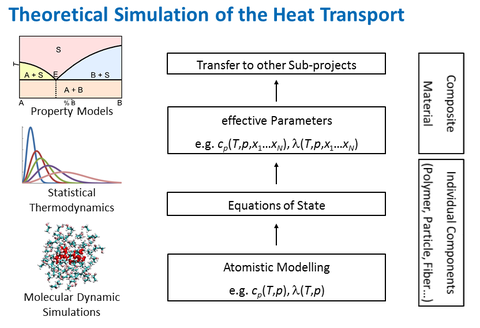Subproject 5: Theoretical modeling and experimental characterization of heat transport in interactive fiber rubber composites
Motivation
To predict the thermo-mechanical behavior of fiber composites that are characterized by high heterogeneity at different scales, theory and experiment must be connected in an adequate way, and their predictive approach must enter the molecular level.
State of the art and preliminary research
The thermal behavior of polymer-based materials as well as the coupling of theory and experiment were previously described. Polymers have been studied theoretically at different levels of complexity, whereat a multiscale description in combination with strengthening, functionalization, hybridization, and gradation has not been carried out so far.
Our own preliminary research focused on the theoretical and experimental determination of heat transport properties as well as coupled adsorption phenomena , ab initio studies of individual molecules (e.g. conformation), and modeling of physical properties of different substances. However, there is still a great need for research regarding the characterization, modeling, and simulation of the non-steady thermal behavior of strongly anisotropic composites.
Scientific questions and project objectives
This subproject aims at creating a comprehensive study of interactions on the micro and molecular scales to derive principles, which can be applied to a mesoscopic description of the connected non-steady heat transport phenomena of interactive fiber rubber composites under mechanical load using closely linked experimental and theoretical methods. The thermal behavior of strongly inhomogeneous composites will be studied to characterize and model the complex material properties on different scales under consideration of associated interface stresses. The subproject is focused on the molecular and microscopic modeling of the thermal effects occurring in composites (elastomer, actuating, and sensoria components, reinforcement fiber) and the related thermal interactions and friction induced heating (functional fiber – reinforcement fiber, fiber – matrix, functional particle – matrix) by FEM. Based on, for example, the theoretical characterization of the specific polymeric chain conformation and the resulting steric arrangements at the molecular and micro scale and, consequently, the thermal stability at meso and macro scale as a function of the configuration, the connection between structure and properties will be derived. In this regard, ab initio calculations and the simulation of vibrational spectra, which characterize the dynamics and the thermal stability of the system, facilitate the specification of thermal parameters (e.g. coefficient of thermal expansion). Furthermore, conclusions about the interactions between the several components by characterizing polar and non-polar regions should be drawn to predict the interface behavior and to modify the material. Measurements of the functional interrelation of the heat transport, such as the determination of the coefficient of thermal conductivity by the hot-wire method, the thermal expansion properties, and the influence of the composition of the interactive fiber rubber composites at the molecular and the micro scale are indented to validate the simulations.
Contact
Institute of Power Engineering (IET), Chair of Technical Thermodynamics, Faculty of Mechanical Science and Engineering
 © Lutz Liebert/TUD
© Lutz Liebert/TUD
Leiterin der Professur
NameMs Prof. Dr. rer. nat. habil. Cornelia Breitkopf
Send encrypted email via the SecureMail portal (for TUD external users only).
Visiting address:
Merkel-Bau, Zi. 106 Helmholtzstraße 14
01069 Dresden

